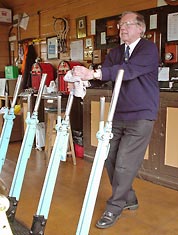
Operating Departments
Guards
The guard is in charge of the train and it is his/her duty to ensure the safe passage of this and the passengers by maintaining a close watch on signals and all safety aspects.
Training to become a Guard is in two parts:
Part 1 (which can be commenced immediately) covers knowledge of all station layouts and signalling together with the techniques employed in shunting of stock (see Shunter).
Part 2 covers the duties of a Guard on a service train.
Both parts of the course are arranged on a flexible basis to suit the volunteer’s availability and rate of learning. A dress code operates for this department and a medical needs to be passed.
Shunters
The shunter performs a vital operational role in movement of stock either to bring it into service or to store it away at the end of the day. Other tasks include reforming of trains to add, remove or reorder carriages in a train and opening and closing the Carriage Shed at Kidderminster. Most shunting by volunteers is done at the weekends.
A medical needs to be passed.
Travelling Ticket Inspector
Life as a Travelling Ticket Inspector (TTI) centres around 3 key areas - Ensuring the safety of our passengers, ensuring that they have the appropriate tickets, and "public relations".
The key requirements are to be welcoming and helpful to our passengers - often working with other departments to ensure their needs are met or exceeded. Many of our visitors don't understand things like timetables, or how the doors operate on a heritage set of stock, so we need to be ready and willing to assist. You will need to be able to handle cash, interpret fares, issue handwritten tickets and at the end of the day reconcile cash taken. Training will be given, normally taking between 8 and 12 days.
TTIs need to be smartly turned out in the correct uniform and this can involve some expense. There is a minimum standard for eyesight (same as that required for a UK Driving Licence). You will need a "Personal Track Safety Certificate" and have an understanding of "Working at Height" - we will help with this.
Signalling Department
Volunteers wishing to become signalmen are usually placed at a station to learn about the railway before being called for signal training. This takes the form of classroom tuition prior to being assigned to a specific signalbox. Courses usually run once a year starting in November. There is usually a waiting list as numbers are limited to 8.
As the volunteer becomes experienced he/she will probably wish to become involved with more signal boxes which will, naturally, involve additional practical training.
One of the staple departments of the railway, signalling can be a most rewarding area to enter which, after training, can provide a variety of locations at which to work. A dress code operates for this department.
Introduction to being a Guard
Watch an introduction video to becoming a guard on the Severn Valley Railway.

Signalman setting the road in Bewdley North Signal Box.